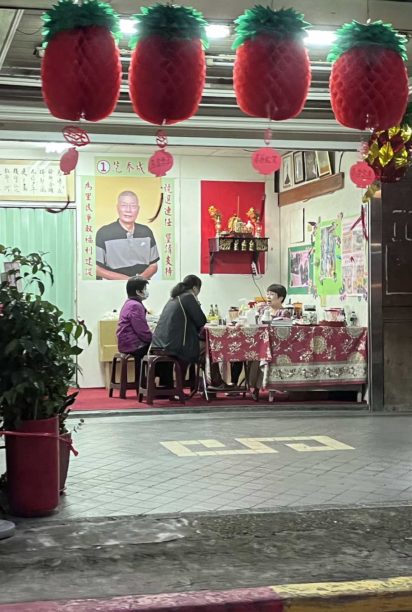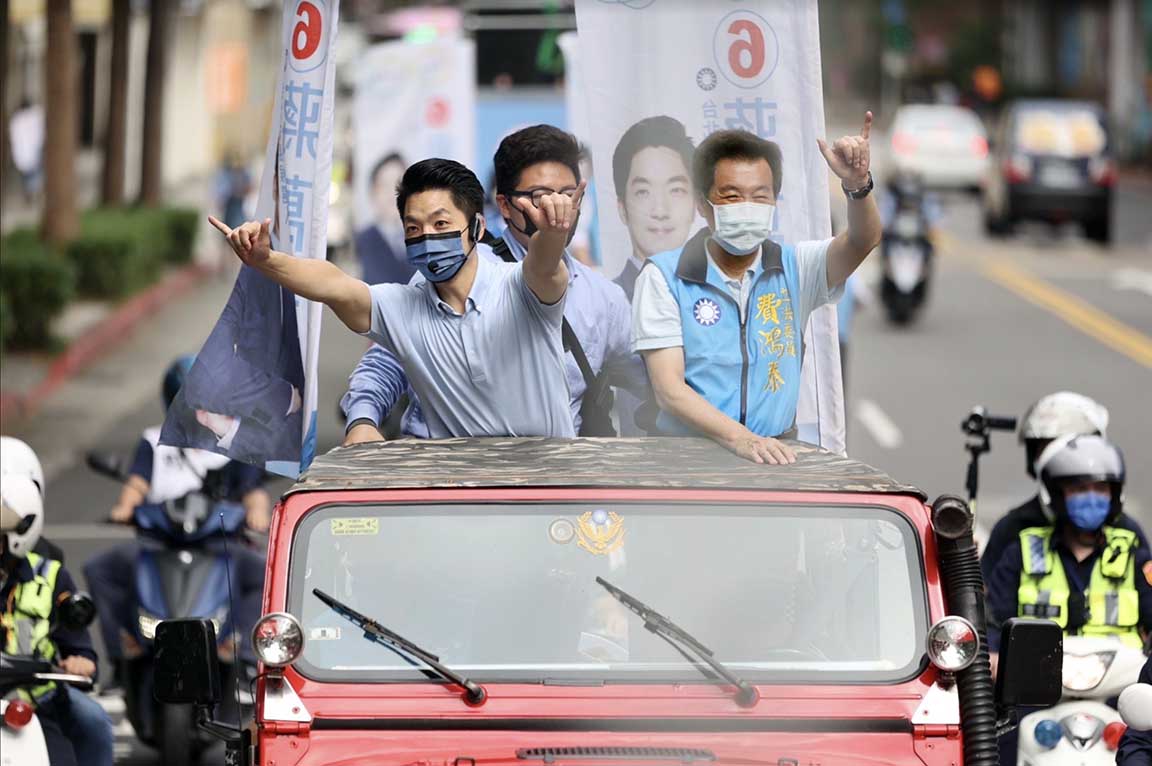I LIVE ABOVE a major intersection in Taipei, so around the last week of elections, the candidates drive past my place in their campaign trucks multiple times per day. There’s a candidate around here who likes to blare the Ride of the Valkyries, which I get a kick out of. Another had a campaign office that resembled a storefront rented out for a funeral.
On election day I was on the radio for a few hours before I raced off to the livestream event organized by New Bloom, the publication I run. Unfortunately I realized too late that I needed my computer both for the livestream, and to write my election report. For forty-five strange minutes, the guests for the live-streaming party were forced to watch me type out an article on a large projector screen. I tried to think of it as performance art.

Well, the election results were disappointing. Taipei elected the great-grandson of Chiang Kai-shek, the former dictator, as mayor. Authoritarian nostalgia is alive and well, for some. In other parts of Taiwan, corruption charges or even gang-related murder charges proved no obstacle for some candidates being elected. Although Taiwan has democratized, authoritarian legacies still persist. That the former authoritarian party is still around and continues to be a viable political force is one of them.
But I wasn’t all that surprised. The Kuomintang has always done better in local elections. That’s the legacy of clientelist and patronage networks going back decades. As for me, I was always amused that this new Chiang, who is illegitimate, actually changed his last name, as did his father, as part of their original bid to seek political office. I’m from a Kuomintang family myself—my grandfather, a high-level banking official, was allegedly driven around in one of the Chiangs’ hand-me-down bulletproof cars—and I find the notion of being proud of such a past really quite offensive. Imagine that, being rather proud of your family’s wrongdoings even when you’re directly descended from a dictator.
International analysts should be wary of taking the wrong message from the results of these elections. Though I expected the Kuomintang to do well, that’s not because Taiwanese people are suddenly favoring China; it’s important to understand that the elections were primarily about domestic issues, not cross-strait relations. For a historically obscure place in the world that is also a potential geopolitical flashpoint, misleading perceptions—not to mention disinformation—can be highly dangerous.
Heck. The week of elections, I watched twenty hours of debates from ten cities. Mayoral hopefuls campaigned on voters’ concerns about Taiwan’s poor economic growth and demographic issues, not cross-strait relations. Low salaries, long working hours, unaffordable housing, an increasingly elderly population, and the lack of opportunities for young people were top of mind; cross-strait issues rarely entered into the equation.
The Kuomintang managed to retake many of its traditional territories, while the Democratic Progressive Party (DPP)—the historical opposition, which emerged from Taiwan’s democracy movement—clung to its mainstay strongholds in southern Taiwan. Much of the progress made by the DPP over the past decade in making inroads into the Kuomintang’s dominant areas was undone.
Fortunately, those of us who’ve spent the last few weeks trying to hammer this point home seem to have made a difference; I haven’t seen as many bad takes claiming that the election results were the result of a sudden tilt toward the pro-China Kuomintang.
This election wasn’t as bad as in 2018, when I heard stories of people trying to kill themselves after the election results, particularly after a referendum against gay marriage passed. This set of elections simply wasn’t as intense or as heated. Maybe anticlimactic at best. But the defeat of the referendum to lower the voting age from 20 to 18 was disappointing. Taiwan has one of the world’s highest voting ages–90 percent of 190 countries have the voting age as 18. High barriers for changing the constitution, combined with the typically low turnout for local elections, made passage unlikely.
After the election party wrapped up, I ended up going clubbing with some of the other members of my publication. I stayed out…until 7 a.m. The next day I learned about a solidarity vigil in Liberty Plaza for ongoing protests in China. Friends outside Taiwan began forwarding messages like, “Hey, this is in your neighborhood.”
The protests broke out after the deaths of ten residents who people believe were locked down in quarantine in a building in Urumqi; firefighters had been unable to enter the building to save them. In city after city, Chinese citizens took to the streets in protest of the Chinese government’s refusal to abandon its increasingly ineffective COVID-zero policy. These protests began only days after riots in FoxConn factories in locked-down Zhengzhou, as thousands of workers fled quarantined factory facilities on foot.
Some say that these are the largest demonstrations in China since the 2011 Wukan protests—or even Tiananmen Square.
It was rather jarring to realize that all this had been going on in China while I had been hyper-focused on the Taiwanese elections. I was running on too little sleep, but, well, duty called.
At the rally, some were chanting slogans for Taiwanese independence along with their support for the Chinese demonstrators. Some reflected on the defeat of the election. At one point, during an open mic period, some random American dude carrying a Kuomintang and Chiang Wan-an flag went up and started ranting about how Taiwan should have a foreign legion. I found that amusing.
It’s still too early to know what the outcome of the protests will be. I had spent the weekend zoomed in on one macro-level event, the elections that would have ramifications for all of Taiwan, as large events were unrolling across the straits in China. But history happens with little or no warning, and on its own timetable, with or without you.
Brian Hioe is the publisher of No Man is an Island, a fellow member of The Brick House Cooperative.
Thank you for reading POPULA! Add your email here to receive our newsletter!






